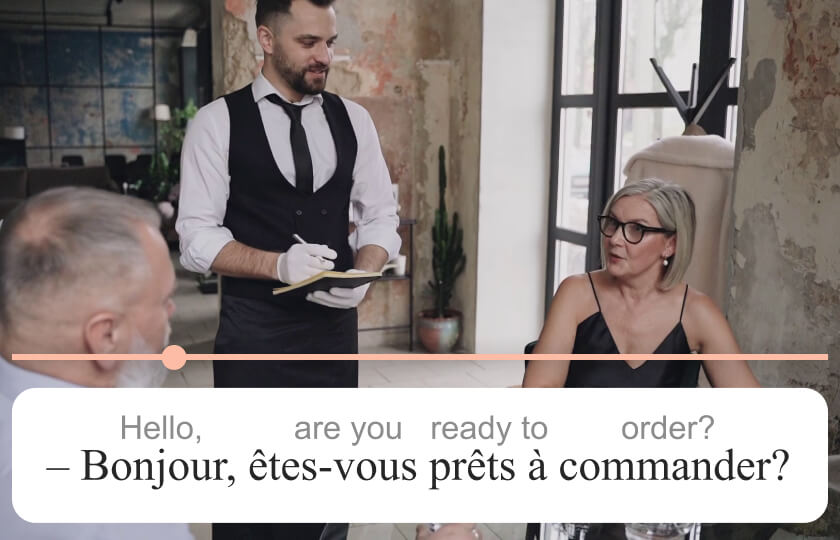Learning French has never been more accessible, thanks to the variety of apps available today. Whether you’re a complete beginner or looking to brush up on what you learned in school, there’s an app for everyone. However, this much variety can be overwhelming, and many learners don’t realize that some popular apps might not be the best choice for them.
So, we rolled up our sleeves and tested over 20 apps for learning French. Let’s look at their strengths and weaknesses, and find out which app is the best for the most common use cases.
Best French apps by category
There is a lot to cover, and we know that you’ve got places to be and things to do. So, here is a quick rundown of the French language apps that excel in different areas. Just pick the one that fits your goal and learning style.
- Best app for beginners: Lilata
- Best app for real-life situations: Babbel, Lilata
- Best app for speaking practice: Pimsleur
- Best app for vocabulary building: Memrise
- Best app for learning grammar: Wlingua
- Best app for language exchange: HelloTalk
- Best app for learning through video: LingoPie
- Best app for travelers: Busuu
- Best free app: Duolingo
- Most fun app: Duolingo, Frantastique
- Best app for advanced learners: LingoPie, Frantastique
Now, let’s dive deeper into what the top apps have to offer.
Lilata
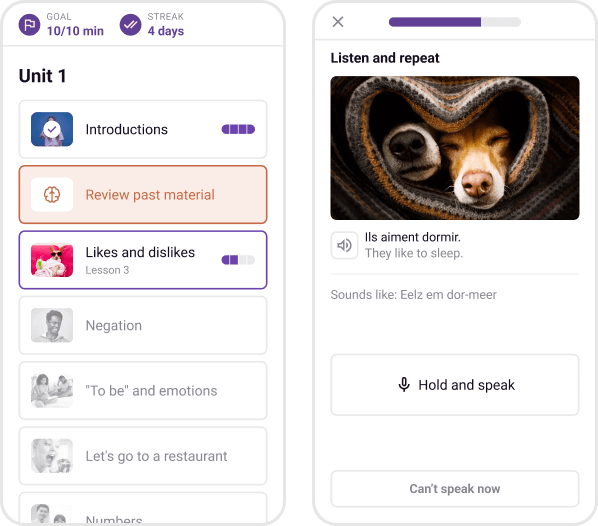
Lilata is a fantastic choice for beginners and those who want to learn practical, conversational French. Designed with real-life scenarios in mind, the app emphasizes practicing skills you can apply in everyday situations. You’ll practice listening, speaking, reading, and writing through short visual lessons with just enough grammar tips to keep learning fun. The app also uses spaced repetition to help with long-term memorization. However, you need a good internet connection to use it comfortably.
Pros:
- Practical language: Focuses on words and phrases you will use in everyday scenarios.
- Short visual lessons: Each lesson takes 5 minutes and contains lots of images, helping to create visual associations for new vocabulary.
- Simple grammar tips: Lessons have just enough explanations to make understanding French grammar manageable.
- Funny content: Some of the images and sentences in the course are hilarious, which makes learning less tedious.
- Spaced repetition: The app makes you review lessons at the optimal times to reinforce retention of new vocabulary in your memory.
Cons:
- Limited advanced content: Not ideal for advanced learners looking for more complex material.
- No offline mode: Requires an internet connection to access lessons.
- Can be buggy: Some users report technical issues with the app.
Pricing:
- $70/year in the US. Prices may vary in other countries.
- 7-day free trial.
- Shorter-term plans are also available.
Babbel
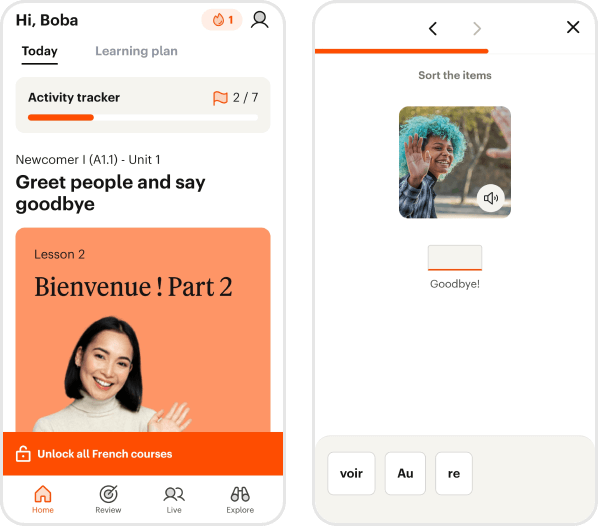
Babbel is great if you prefer a clear, step-by-step approach to learning. The lessons, designed by language experts, focus on building a solid foundation in grammar, vocabulary, and conversation. The app emphasizes practical language skills and offers personalized reviews. However, it focuses more on reading and writing, so you might not get as much speaking practice. Some people might find lessons a bit dry.
Pros:
- Well-rounded lessons: Short topical lessons with exercises training different skills (reading, listening, writing, speaking). Lessons get progressively harder, ensuring a solid learning path.
- Practical scenarios: Lessons focus on situations you’ll encounter in everyday life.
- Review sessions: Regular reviews help reinforce what you’ve learned, aiding long-term retention.
- Grammar tips: Some cards in lessons are devoted to grammar rules with practical examples to help you grasp the basics.
- Cultural notes: Fun facts about French culture enhance your learning experience and provide context.
- Live classes: You can join a small group of learners or study one-on-one with a real French teacher, although this comes at an extra cost.
Cons:
- Feels like a classroom: Lessons are dry and textbook-like, which could kill motivation over time.
- Limited speaking practice: More focus on reading and writing, with fewer opportunities to practice speaking.
- Speaking exercises don’t work great: Some users report that the app doesn’t pick up their voice or understand them when they speak at a normal pace.
- Can be buggy: Some people experience technical issues with the app, especially when a new version is released.
Pricing:
- $84/year in the US. Prices may vary in other countries.
- 7-day free trial.
- Shorter-term plans are also available.
Rosetta Stone
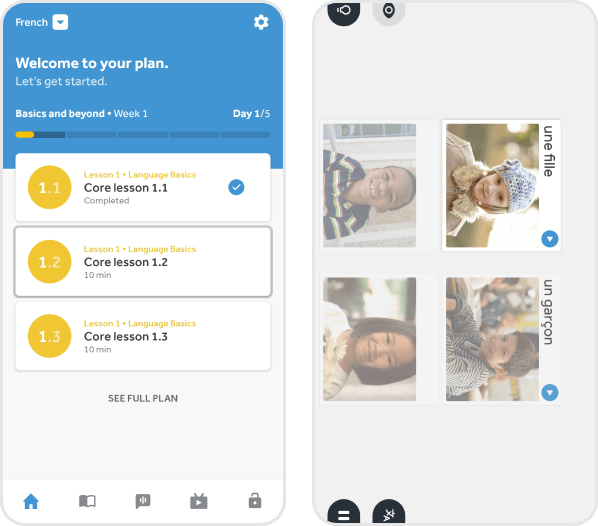
Rosetta Stone is a noteworthy app for those seeking an immersive language learning experience. The app uses a method that emphasizes learning through context, similar to how we learned our first language. It avoids translations and instead teaches you to think in French from the start, helping to build a more intuitive understanding of the language. However, the immersion method might feel challenging for absolute beginners, and the subscription cost is on the higher side.
Pros:
- Immersive method: Teaches you to think in French by using pictures and context rather than translations. Great for visual learners.
- Real-world practice: Lessons designed to mimic real-life situations, enhancing practical language use.
- Variety of exercises: Includes speaking, listening, reading, and writing activities to reinforce learning.
- Supplementary resources: Comes with extra on-demand video lessons, phrasebooks, and stories.
Cons:
- Challenging for beginners: The immersion method might be tough for those with no prior knowledge of French. Not much is explained explicitly.
- Limited listening and speaking: Most exercises focus on reading and writing skills.
- Little cultural content: Less focus on cultural notes compared to some other apps.
- Expensive: The free trial is short and the subscription is more expensive compared to other language learning apps.
Pricing:
- $168/year in the US. Prices may vary in other countries.
- 3-day free trial. Might not be available for some plans.
- Several shorter- and longer-term plans are also available.
Memrise
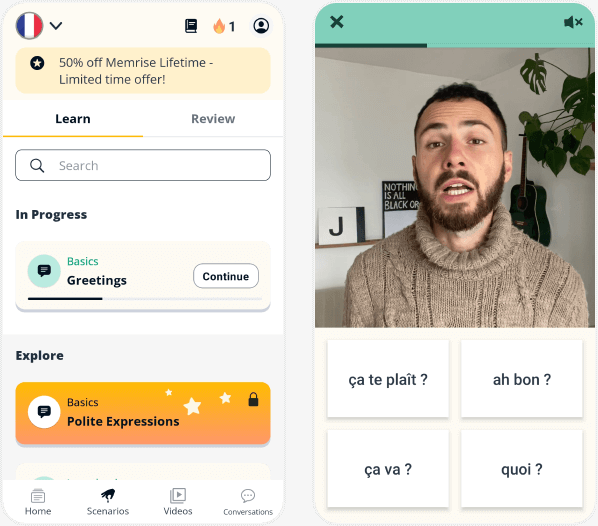
Memrise is a solid choice for boosting your French vocabulary. It uses spaced repetition, showing you flashcards with words and phrases at just the right times to help you remember them. Many cards contain videos of native speakers and use clever tricks to improve memorization. However, it’s more about vocabulary and less about grammar or in-depth language skills.
Pros:
- Spaced repetition: Helps keep words fresh in your memory by reviewing them at optimal times.
- Native speaker videos: Real-life videos help you improve your pronunciation and listening skills.
- Mnemonic techniques: Uses memory aids to help you remember words and phrases through association.
- Engaging and fun: The gamified elements make learning feel like playing a game, keeping you motivated.
- Free version: You can use the app for free, but the amount of learning you can do per day is limited, as well as access to most features.
Cons:
- Not comprehensive: While it’s good at teaching vocabulary, it doesn’t cover all aspects of the language you need to know. So you might need to supplement it with other learning resources.
- Limited grammar focus: Doesn’t dive deep into grammar rules. You’ll have to learn them elsewhere.
- Requires internet: Most features need an internet connection, which might be a drawback if you want to study offline.
Pricing:
- Free version: Limited access to lessons and features.
- Paid version: $72/year in the US. Prices may vary in other countries.
- Several shorter- and longer-term plans are also available.
Duolingo
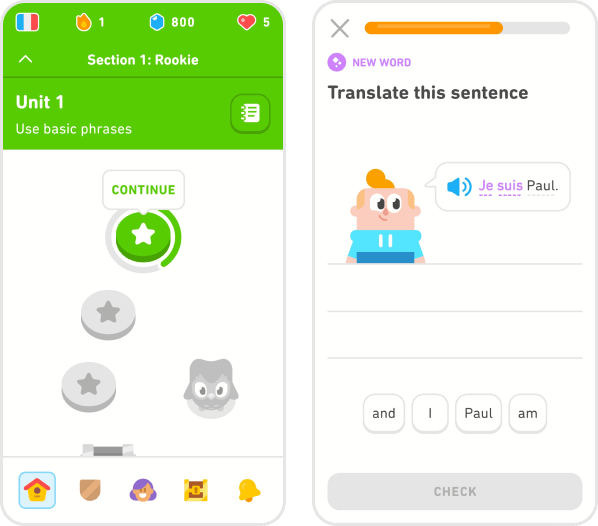
Duolingo turns learning into a game, making it fun and easy. The bite-sized lessons are rewarding and can fit into any schedule. You’ll practice reading, writing, listening, and speaking skills. Duolingo makes sure its users have a good time, but that comes at the expense of learning quality and speed. It’s not a bad choice if you’re starting to learn French just for fun. If you want to truly understand and speak the language in the foreseeable future, there are better options out there.
Pros:
- Gamified learning: Makes learning fun with rewards and challenges, helping to keep you motivated.
- Bite-sized lessons: Short lessons are easy to fit into a busy day, making consistent practice manageable.
- Comprehensive skill coverage: Includes reading, writing, listening, and speaking exercises.
- Mostly free: Offers courses for free, which is great for learners on a budget. The free plan has a limit on the number of mistakes you can make per day, and several other downsides.
Cons:
- Limited depth: Lessons may not be challenging enough for those seeking advanced language skills. Grammar explanations are hidden and not embedded into lessons.
- Slow pace: The app introduces very few new words and phrases at a time, and makes you do multiple identical lessons with them. This gets monotonous over time.
- Less focus on conversation: Not as strong in promoting real-life conversational skills compared to other apps.
- Excessive gamification: While some game mechanics are great, many users feel Duolingo overdoes it, making the app feel more like a game than a learning tool.
- AI-generated content: Many lessons are now generated by AI and may contain errors.
- Ads in free version: Ads in the free version can be distracting and interrupt the learning flow.
Pricing:
- Free version: Daily learning limits, ads.
- Paid version: $84/year in the US. Prices may vary in other countries.
- Several shorter- and longer-term plans are also available.
Busuu
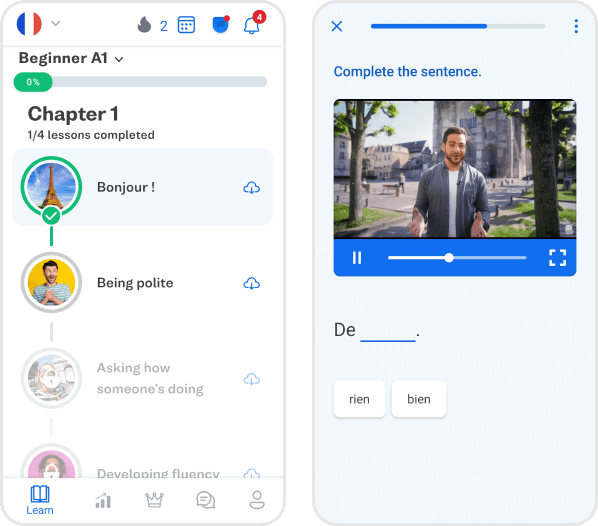
Busuu is a great app if you enjoy learning with the help of a community. It offers personalized study plans and allows you to practice with native speakers, which can be a big boost to your confidence. The app covers a range of skills, including reading, writing, speaking, and listening. There is a free version of the app that allows you to learn in exchange for viewing ads, but the learning experience feels quite limited.
Pros:
- Community support: Allows users to record responses to exercises and ask native speakers for their feedback.
- Personalized study plans: Tailored lessons to fit your learning goals.
- Comprehensive skills coverage: Exercises for reading, writing, speaking, and listening.
- Good grammar section: There is a dedicated part of the app that nicely organizes grammar explanations.
- Human touch: Many words and phrases in lessons have videos of native speakers saying them.
- Free version: The app can be used for free, but your daily learning is restricted, and many features remain locked.
Cons:
- Lessons are a bit short: Often, after completing a lesson, it feels like you didn’t quite memorize the new material and missed some details.
- Quality of feedback can vary: While it’s great that you can connect with native speakers, the quality and usefulness of their responses aren’t always the best.
- Speaking exercises don’t work great: Some users say that the app doesn’t understand their voice or has issues with their microphone.
Pricing:
- Free version: Limited access to lessons and features, ads.
- Paid version: $83/year in the US. Prices may vary in other countries.
- Shorter-term plans are also available.
Pimsleur
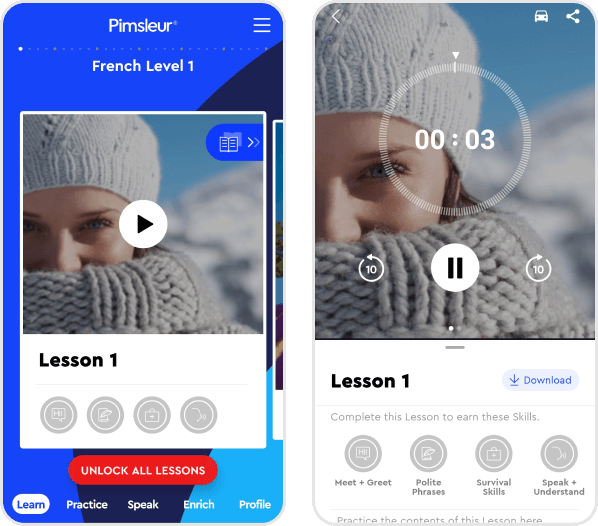
Pimsleur is perfect for those who want to learn French while on the move. The app focuses on audio-based learning, making it easy to practice while commuting, exercising, or doing chores. Each lesson is about 30 minutes long: you listen to French words and phrases, then repeat them or participate in a conversation. The app is good at breaking the fear of speaking, but it may not cover reading and writing as thoroughly as other apps (although it does include many of the exercises other apps offer). Some learners find the pace a bit slow.
Pros:
- Great for multitasking: Audio-based learning lets you learn while commuting, exercising, or doing chores.
- Emphasis on speaking: Helps you master French pronunciation and conversational skills.
Cons:
- Limited reading and writing practice: Focuses mainly on listening and speaking, with less emphasis on reading and writing skills. Since French spelling and pronunciation are so different, learners may not know how to spell the learned words.
- Can be boring: Some learners might find the pace of the lessons too slow and the process too repetitive.
- Long lessons: Each lesson is around 30 minutes, which is much longer than in other apps. This isn’t necessarily a problem, but some people find it hard to finish a lesson in one go.
- Little grammar explanations: If you don’t understand something, there is no way in the app to get explicit instructions.
- Subscription required: Free trial is very short, while full access to lessons requires a relatively expensive subscription.
Pricing:
- $21/month in the US ($252/year). Prices may vary in other countries.
- 7-day free trial. Might not be available for some plans.
FluentU
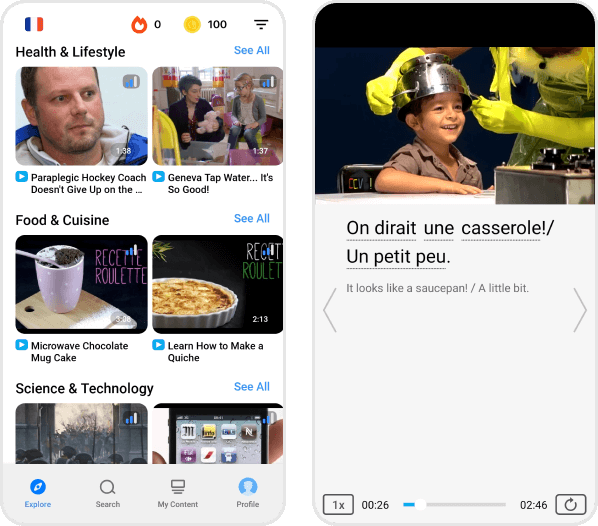
FluentU is a good app for those who enjoy learning through videos. It uses authentic content like movie clips, music videos, and news segments to teach French. This approach not only makes learning more engaging but also helps improve your comprehension skills. Each video comes with interactive subtitles, so you can click on words to see definitions and examples. However, it might be too hard for beginners and doesn’t provide as much structured practice as some other apps.
Pros:
- Real-world videos: Learn through authentic content like movie clips and music videos.
- Interactive subtitles: Click on words in the subtitles to see definitions and examples.
- Improves listening skills: Great for enhancing listening and comprehension with native speakers.
- Personalized learning: Tailors video recommendations to your learning level and interests.
Cons:
- Not for beginners: You need to already know French at a decent level to understand native speakers.
- Limited practice: Doesn’t focus on practicing new words and phrases, and lacks structured grammar explanations.
- Requires internet: Needs a connection to stream videos.
- Expensive: Full access requires an expensive subscription.
Pricing:
- $145/year in the US. Prices may vary in other countries.
- 14-day free trial.
- A shorter-term plan is also available.
LingoPie
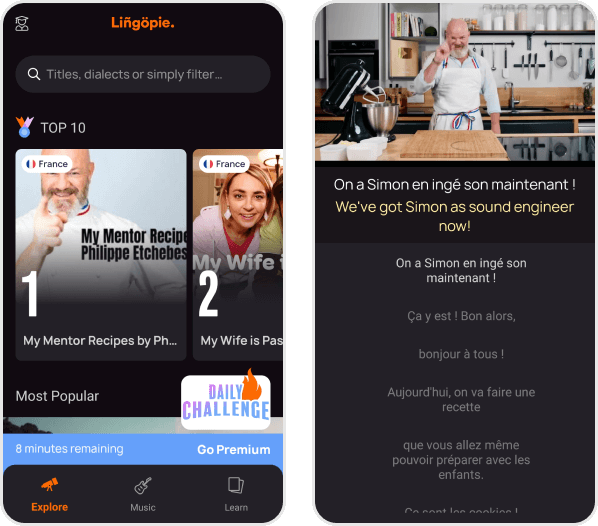
LingoPie is a good choice for those who love learning through entertainment. The app uses TV shows and movies to teach French, making the process fun and engaging. You can watch a variety of content with interactive subtitles, which allow you to click on words for definitions and translations. This method helps improve listening skills and exposes you to the language as it’s naturally spoken. However, it might not provide as much structured practice as some other apps.
Pros:
- Real entertainment: Learn through TV shows and movies, making learning enjoyable.
- Interactive subtitles: Click on words in the subtitles to see definitions and translations.
- Improves listening skills: Great for improving your listening and comprehension with native speakers.
- Wide variety of content: Offers a diverse selection of shows and movies to keep you interested.
Cons:
- Not for beginners: You need to already know French at a decent level to understand native speakers.
- Limited grammar practice: Doesn’t focus on structured lessons and has few explanations.
- Requires internet: Needs a connection to stream videos.
- Expensive: Full access requires a subscription, which might be costly for some people.
Pricing:
- $144/year in the US. Prices may vary in other countries.
- 7-day free trial.
- Several shorter- and longer-term plans are also available.
Wlingua
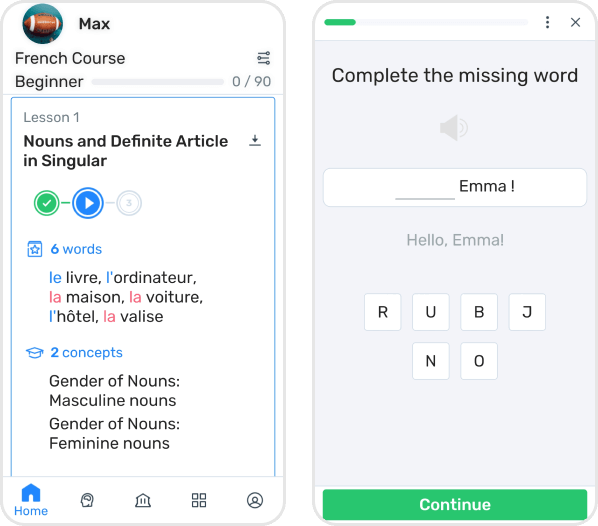
Wlingua is a good app for those who want a thorough understanding of French. It offers structured lessons that cover grammar in depth, along with vocabulary, reading, and listening skills. The app is designed for all levels, from complete beginners to advanced learners. It’s a good choice for serious learners wanting to grasp all the intricacies of the language. Other people might find it too hard and a bit boring.
Pros:
- Deep explanations: Detailed lessons that thoroughly cover French grammar.
- All levels: Suitable for everyone, from beginners to advanced learners.
- Progress tracking: Helps you monitor your learning progress.
- Free version: The app can be used for free, with some limitations.
Cons:
- Limited speaking practice: Less focus on speaking skills compared to some other apps.
- Less cultural content: Doesn’t provide as much cultural context as other apps.
- May be boring: The course is very thorough, requiring you to memorize a lot of information and drill.
- Clunky interface: The app doesn’t look great and can be hard to use sometimes.
Pricing:
- Free version: Basic access with limited features.
- Paid version: $85/year in the US. Prices may vary in other countries.
- Shorter-term plans are also available.
HelloTalk
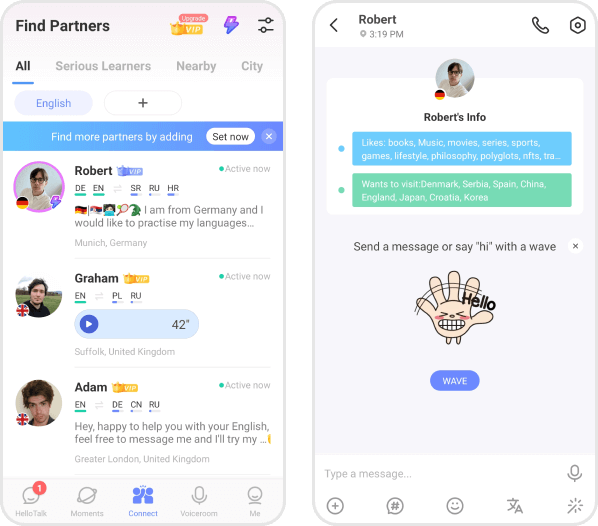
HelloTalk is one of the best apps designed to connect language learners with native speakers around the world. It allows you to practice French by chatting with native speakers through text, voice messages, and even video calls. It’s an excellent way to get real-life practice and cultural exchange. The app also features built-in translation tools, grammar corrections, and the ability to ask questions to the community.
Pros:
- Real-life practice: Chat with native speakers to improve your conversational skills.
- Multimedia communication: Use text, voice messages, and video calls for a more comprehensive learning experience.
- Built-in tools: Translation, grammar corrections, and community Q&A enhance learning.
- Cultural exchange: Learn about French culture directly from native speakers.
- Free version: The app can be used for free, with limitations.
Cons:
- Not for beginners: You need to already know French at a decent level to understand native speakers.
- Inconsistent partner quality: The experience can vary greatly depending on the language partners you find.
- Privacy concerns: Sharing personal information with strangers might be uncomfortable for some people.
Pricing:
- Free version: Basic access with some limitations.
- Paid version: $80/year in the US. Prices may vary in other countries.
- Several shorter- and longer-term plans are also available.
Frantastique
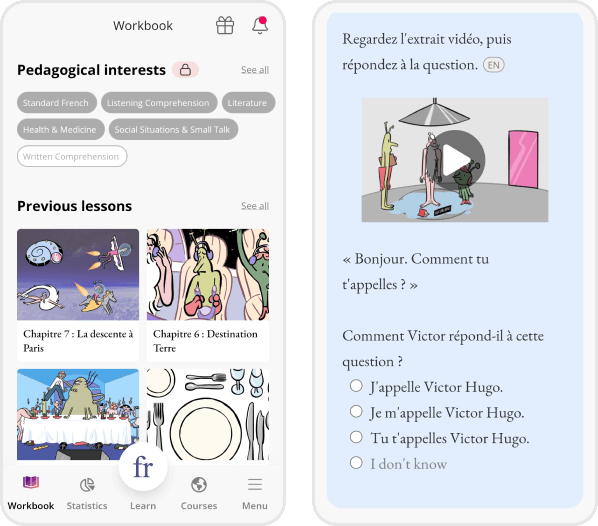
Frantastique offers a unique approach to learning French: each day, you get a lesson featuring a funny story, some grammar instructions, cultural information, and related exercises. This makes learning fun and keeps it fresh. Additionally, you can chat with an AI version of Victor Hugo. However, the humor might not be to everyone’s taste, and the subscription cost is higher compared to most other apps.
Pros:
- Entertaining content: Lessons are filled with humor and storytelling, making learning enjoyable.
- Immersive learning: Lessons are completely in French, with some English support if you need it.
- Cultural insights: Offers interesting cultural notes.
- Daily lessons: Keeps you consistent with daily practice.
Cons:
- Not for beginners: Lessons start at the lower intermediate level.
- Quirky humor: The style of humor might not appeal to everyone.
- Less focus on speaking: While engaging, it might not provide as much speaking practice as some other apps.
- Quite expensive: More expensive than most other language learning apps.
Pricing:
- $253/year in the US. Prices may vary in other countries.
- 7-day free trial.
- A shorter-term plan is also available.
Frequently asked questions
Can I become fluent in French with an app?
While apps can significantly help you learn French, becoming fluent typically requires more than just app-based learning. Apps are excellent for building vocabulary, understanding grammar, and practicing listening and speaking skills. However, achieving fluency usually involves real-life conversation practice, immersion in the language, and consistent, comprehensive study. Combining app usage with other methods like speaking with native speakers, taking classes, and immersing yourself in French media can greatly enhance your path to fluency.
Are there completely free French apps?
There are very few completely free French learning apps, and those that exist often provide a lower quality of learning. For instance, Duolingo offers their course for free, but with limitations, such as a cap on the number of mistakes you can make before needing to wait or watch ads to continue. For more comprehensive and smooth learning experiences, investing in a paid subscription can be worth the money. On average, this will cost you under $100 per year, or $15 per month.
How can I teach myself French for free?
Teaching yourself French for free is possible using a variety of resources. Utilize apps like Duolingo and Clozemaster for structured lessons and vocabulary practice. Explore free online courses from platforms like Coursera and Open Culture. Watch YouTube channels such as Learn French with Alexa and FrenchPod101 for video lessons. Practice speaking with native speakers on language exchange platforms like HelloTalk and Tandem. Additionally, borrow French language books from your local library or access free resources online like BBC Languages and TV5Monde. Consistent practice with these tools will help you learn effectively.
Final thoughts
Apps are one of the best ways to start learning French. Each app has its strengths, so combining multiple apps can give you a well-rounded learning experience — one might be great for grammar, while another excels at conversation practice. In most cases you can start learning for free, but buying a subscription can often boost your learning efficiency.
While apps won’t make you fluent on their own, they are an excellent starting point. Stay consistent, practice regularly, and don’t get discouraged if learning gets hard. With dedication, you’ll make great progress. Happy learning!
